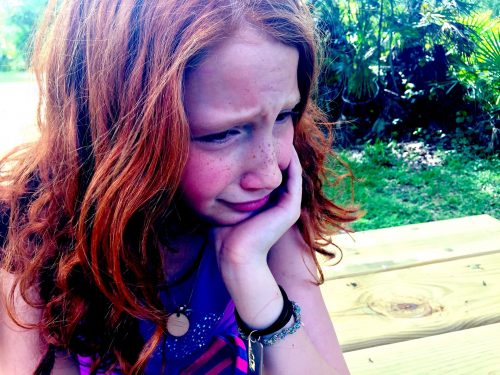Most often, we already know the usual reactions of our children when they are excited about something, or when they are reprimanded for what they did, or when they don’t get what they want. We know their faces when they’re sad or irritated or hurt. However, despite how much you know your child, you must pay attention to how long she has been nurturing that sadness, that anger, that frustration. Because when these emotions stay for a long time and have been hindering your child from functioning normally, then she might just be depressed.

Depression In Kids
According to Kurt Smith, Psy.D., LMFT, LPCC, AFC “Depression is different from passing sadness or temporary frustration with life’s issues. There are number of common signs for depression and they tend to be persistent.” Depression is a mental health condition that has typically been observed and acknowledged in adults. But studies from the past and present have proven that kids, too, can develop depression, and lingering sadness is one of the earliest signs that they are indeed depressed. Other equally alarming signs include negative thinking, self-critical, complaining often, and reduced self-esteem.
Depression can disrupt one’s focus, sleep, appetite, and life as a whole. Children who are depressed lose interest in activities that they used to enjoy. They always look tired and sad, and they don’t like talking and socializing, even with family and friends. Most of them feel useless, abandoned, and unloved. When they are extremely depressed, some kids contemplate suicide.
Identifying Depression
Depression presents in various ways, and it is crucial that when parents see extreme sadness in their kids that has been lingering for some time, that they let their primary doctor know about this.
Depression Diagnosis
“Depression symptoms are particularly troubling if someone displays more than one, or if they persist for more than two weeks.” That is according to Simon Rego, PsyD, associate professor of clinical psychiatry. Doctors and other mental health professionals diagnose depression using different classifications. The constant variable in these classifications is a depressed mood, but they develop differently.
- Chronic depression is a depression that lasts for two years or more. It develops incrementally. It is also known as dysthymia.
- Major depression is a severe type of depression that just presented currently, although it lasts for a minimum of two weeks.
- Seasonal affective disorder is associated with exposure to light. Those who experience this usually feel gloomy in the winter months, when the daylight is shorter, and the weather is cold.
- Disruptive Mood Disorder is a series of extreme, recurrent temper outbursts that may present as anger or aggressiveness. Children over six years old have been observed to present with this type of depression, which is described as irritability that lasts for at least one year.
- Bipolar Disorder, also known as manic-depressive disorder, is a condition that presents as severe depression accompanied by bouts of mania.
How You Can Help
Depression, anxiety, and other mental health conditions can improve and get better with the appropriate treatment and care. On the other hand, they can get worse if they are left untreated. Doctors and other members of the healthcare team can very well help alleviate your child’s condition, but you too can do your part as a parent.
Talk To Your Child. Often, children don’t recognize sadness and depression, so talk to them about it. Ask your child how he feels and observe his facial expressions and body language as he expresses his emotions. Listen, don’t judge, and just be the loving parent that you are. “Be supportive and let them know it is not that you think something is wrong with them, but that you want them to have some help with their current challenges. Sometimes, people who are depressed want help but don’t know how to get started.” A reminder from Vara Saripalli, PsyD.

Have Fun Together. If you’re a busy parent, then quality time is more important than lots of worthless time (like watching television without talking). Go out together. Have a snack or just cook together. You’ll know your child better if you spend quality time with him. He will also learn to trust you and be confident that you are on his side.
Be Patient. When your child displays anger or irritation, you tend to be angry towards him too. When you feel this way, remind yourself that your child is not capable of controlling his feeling, especially if he’s depressed. It is your responsibility to be patient with him. Help him understand what he’s going through and assure him that this is a stage that he will soon overcome as long as he is honest and is obedient with his doctors’ instructions. Throughout his depression journey, never forget to show him your unconditional love, because it is one of the strongest weapons he can use to fight depression and win over it.
